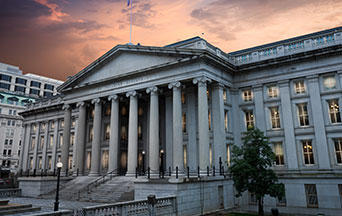
For decades, liberal politicians have ridden a politics of envy into power. These rabble-rousers hold the classic Marxist notion of a class struggle of the rich oppressing the poor. One particular area of concern is the idea that the rich contribute too little to the tax burden and must be made to pay their fair share.
From the fifties through the eighties, the Democrats told everyone that we could have more benefits and “the rich” would pay for them. The Republicans usually responded that the benefits were too expensive and they could be trusted to act more responsibly than their opponents.
However, the results of this public largess were impressive. The Democrats had the majority in every Congress elected between 1954 and 1994. Most of that time, the margin wasn’t even close. During the heyday of Lyndon Johnson’s big-spending “Great Society” (1965-1967), the House of Representatives had 295 Democrats and 140 Republicans. The margin in the Senate was 64-36.
Eternal and Natural Law: The Foundation of Morals and Law
One of the last active Democrats from their halcyon days lives in the White House. Joseph Robinette Biden, Jr. first won election to the United States Senate in 1972. The U.S. political scene has changed markedly over the last fifty-two years, but not so much that the popularity of spending taxpayer’s money has diminished, especially if that nagging sense of responsibility is removed.
A Seemingly Simple but Unattainable Goal
Mr. Biden—and many other panderers for popularity—use the phrase “fair share” to convince voters that someone’s desire to keep most of their money harms everyone else.
Consider these quotations from the 2024 “State of the Union Speech.”
“It’s my goal to cut the federal deficit another $3 trillion by making big corporations and the very wealthy finally beginning to pay their fair share.”
“Look, I’m a capitalist. If you want to make or can make a million or millions of bucks, that’s great. Just pay your fair share in taxes.”
“It’s time to raise the corporate minimum tax to at least 21 percent—so every big corporation finally begins to pay their fair share.”
“I’ll protect and strengthen Social Security and make the wealthy pay their fair share.”
“I see a future where the middle class has—finally has a fair shot and the wealthy have to pay their fair share in taxes.”
Using Popular Resentment to Gain Power
These quotations beg the question of just what Mr. Biden thinks is a “fair share.” These sentiments of fairness reflect the politics of class envy that date back to the French Revolution.
The tactic is to promote the decadence of Christian morals. Then, show the poor that others have more than they have. Revolutionaries can then incite the masses with tales of the over-rich abusing their powers and wealth at the expense of the poor. They can then create a climate where the rich can be forced to part with their excess money, whether through clubs, bullets or ballots—the specific method matters less than the egalitarian socialist spirit behind it.
 Learn All About the Prophecies of Our Lady of Good Success About Our Times
Learn All About the Prophecies of Our Lady of Good Success About Our Times
Such play upon class envy often obscures the facts that show the situation is usually grossly exaggerated. The rich usually pay much more than their fair share.
Digging for Facts
Thus, it behooves us to dispassionately look at the facts. An organization called The Tax Foundation keeps track of many statistics related to the collection of U.S. Federal Income Taxes. This article will consider and contrast two sets of those statistics. These figures come from their 2024 report, which focused primarily on tax collections for 2021, the most recent year for which complete information was available when the report was compiled.
Those who comprise the bottom half of the spectrum receive 10.4% of earnings overall. As a group, they pay 2.3% of income taxes. Conversely, the top half earned 89.6% of income and paid 97.7% of taxes. So far, it is evident that the lower half gets something of a bargain, a burden that the government shifts to the upper half. Nonetheless, the difference is reasonably slight.
However, considering only the wealthiest taxpayers, the picture is very different. The top five percent earn 42% of the money but pay 65% of the taxes. Isolating the top one percent reveals that they make 26.3% of the money while paying 45.8% of the taxes.
So, the statistics reveal that the wealthiest taxpayers earn a little more than a quarter of the total income but pay almost half of everyone’s federal income taxes.
A Question of Interpretation
Of course, hundreds of ways exist to “slice and dice” the information that The Tax Foundation presents. A topic as complex as taxation in a modern industrialized republic lies outside most people’s comprehension, even those of proven intelligence in other fields. That is one reason that the topic is so susceptible to political demagoguery.
Nonetheless, it does appear that paying almost twice the percentage in taxes as one’s earnings is more than paying “your fair share,” no matter what Mr. Biden thinks.
Photo Credit: © TheFotos – stock.adobe.com

